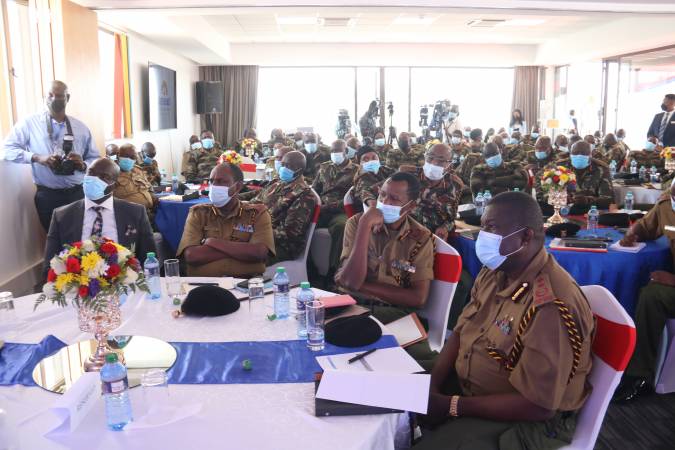12,000 officers battling mental illnesses – report
By Viola Kosome and Zadock.Aangira, January 27, 2022Kenya Police Service has come up with measures to offer psychiatric support amid reports that about 12,000 officers are facing mental health challenges.
Dr Frank Njenga, the chairman of Chiromo Health Group and the presidential advisor on mental health, yesterday blamed the worrying high number of depression cases on the nature of police work. “The risks they are exposed to place them at a higher risk of mental illness,” he said.
The Group’s chief executive, Dr Vincent Hongo, warned that the rate of relapse of officers who had undergone treatment was high, a factor he attributed to lack of support from colleagues and family members.
Njenga said the relapse rate was high at 60 per cent, adding that there was a need to offer psychosocial support to recovering officers. “It is important to note that frontline officers, for instance, those who respond first to distress calls are exposed to Post-Traumatic Stress Disorder.”
National Police Service Commission (NPSC) chief executive Vincent Onyango, who is also the chairman of the Institute of Human Resource Management, said the commission had put in place adequate plans to support affected officers, adding that in special cases, deployment and transfer of officers will consider such factors as their mental health condition.
“An initial study has been carried out. Interestingly enough, it is almost trending towards the global figure of 12 to 13 percent out of the total,” the CEO said.
There are about 110,000 police officers in Kenya.
Though sources said there were about 100 police officers currently undergoing treatment at the Chiromo facility, Njenga declined to disclose the figure, saying the doctor-patient confidentiality clause did not allow them to discuss the details.
Share skills
He was speaking during a training forum for Administration Police Service (APS) county commanders which was also attended by the Deputy Inspector General Noor Gabow.
Gabow said the county commanders were being trained to enable them to deal effectively with mental illness cases affecting their juniors.
“Once a problem is detected or suspected, commanders should act immediately bearing in mind that this is neither discipline nor human resources issue,” he said.
The commanders were urged not to discriminate when their juniors disclosed that they had mental challenges.
The commanders have been equipped with elementary knowledge to enable them to share skills with their juniors and also be able to detect such cases and intervene in good time.
Njenga, however, said they were optimistic that the issue would not go out of control. “We are a happy country. Since the declaration that mental health is a serious issue, we know that we have a problem and have put measures in place,” he said.
The APS head of mental health Dr Daniel Muthondeki, said there was also a need to consider the psychological challenges faced by officers who have retired.
“Reports indicate that many officers, whether they retired as senior or junior officers, have issues after retirement,” he noted. “Our culture is an obstacle. It has been very difficult to accept that mental health is a challenge that we are all predisposed to,” Muthondeki said.
Dr David Wairoto said financial mismanagement was one of the stress factors. He attributed this to reduced income, little or no savings, medical expenses and divorce and separation.
“Most law enforcement officers are at heightened risk for taking their own lives and even killing since they carry or have access to firearms. Most of these firearms include officers’ service weapons,” said Wairoto.
The 2018 joint survey by the United Nations Office on Drugs and Crime and National Police Service conducted among members of the service found that about 61 per cent of the officers were regular consumers of alcohol.
Grim situations
“This trend is worrying, and expected to worsen in the coming days. It thus calls for enhanced efforts to sensitise members of the service on how to manage post-traumatic stress disorder and other expectations while in and out of duty,” Dr John Kibosia, a medical consultant with the NPS cautioned in an earlier interview.
Reports indicate that some police officers use alcohol as a way to cope with the daily stress of their job, or as a way to self-medicate for depression, anxiety or post-traumatic stress disorder.
This, experts say, is exacerbated when they are predisposed while in the course of their duty as alcoholism can be triggered by the stressful and often grim situations they face on the job.
In Kisumu, the police service has kicked off a sensitisation programme in efforts to address the mental health concerns of police officers within the county.
County Police Commander Richard Ng’eno said the programme, which seeks to offer counseling to the officers, will be undertaken in partnership with Life of Children, an NGO.
“We realised that our officers are experiencing a number of issues relating to work, family and personal life and that is why we thought it was wise to bring them together so that they can share with us the issues affecting them,” he said.
